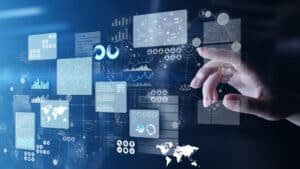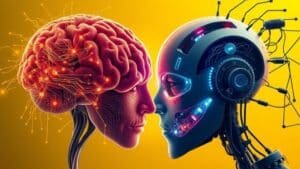Do you know how YouTube recommends videos that you will like to watch? Or, how does Netflix create the perfect suggestion list for you? These are all the tricks marketing professionals use by integrating AI into their work. This not only simplifies their job but is also a shining example of how companies use machine learning for customer retention.
The use of AI and machine learning in marketing has already begun, with the widespread adoption of AI-driven tools and platforms such as ChatGPT, Mailchimp, Google Analytics, and HootSuite Insights. According to Salesforce, 75% of global marketing agencies are either using or experimenting with AI in their marketing strategies.
Another side of using machine learning is maintaining transparency, fairness, and accountability. To ensure these, marketers are especially focusing on data privacy regulations and ethical AI practices. This also means valuing and protecting customer data and upholding trust and compliance with regulations like CCPA and GDPR.
Without further ado, let’s get on with this article in which I discuss some pressing topics related to AI and machine learning in marketing, how helpful they are, use cases, insights, real-world examples, benefits & disadvantages, popular tools, and others.
How Helpful are AI and Machine Learning in Marketing?
Data-driven marketing with machine learning and artificial intelligence is the only way to go, 2025 onwards. Most clever organizations have already understood the assignment and proceeded with AI and ML-driven marketing. Some are still understanding it and planning for implementation. Others who have not yet looked into the future of marketing with ML and AI are losing out. Let me open your eyes with some data:
As per the Marketing AI Institute’s report, 80% organizations utilize AI in marketing just to decrease the time spent on repetitive tasks.
Now, what do we understand by repetitive tasks? Things like collecting customer data, writing ad copies, social media post captions, etc., are made easy with the integration of AI.
According to HubSpot, 92% of surveyed marketers stated that artificial intelligence has already affected their job roles.
The author of ‘Marketing Analytics: A Comprehensive Guide and Marketing Metrics’ and Harvard’s instructor, Christina Inge, states that, “There is a saying going around now, and it is very true that your job will not be taken by AI, it will be taken by a person who knows how to use AI. So, it is very important for marketers to know how to use AI.”
International Data Corporation (IDC) states that there will be a 40% potential increase in the productivity of enterprise marketing due to the adoption of GenAI.
As already discussed, there will be massive time saving on repetitive tasks, content development, social media campaign scheduling, and so much more – all with AI automation.
Use Cases of Machine Learning in Marketing
If you are a marketer and looking for ways to integrate AI and machine learning in marketing strategies, let me share some use cases that you can think about.
Segregating Customers & Ad Targeting
Machine learning-powered marketing software segments customers into clusters by considering various aspects, like:
- Demographic: Age, gender
- Geographic: Country, region
- Psychographic: Interest, lifestyle
- Behavioral: Social media activities, past purchases, browsing history
Now, if you are wondering, how how machine learning improve customer targeting? Once segregated, you can target each of the segments with tailored marketing campaigns and advertisements. This ensures that your marketing has the highest chance of engagement.
Recommendation Systems
Coming back to my first statement, platforms like YouTube, Netflix use ML-driven recommendation systems to personalize content suggestions based on customer interaction, browsing history, behavior, etc. Even e-commerce brands like Amazon curate product suggestions based on customers’ purchase history, reviews, and other factors. Customers don’t have the patience to navigate through huge product catalogs. A curated list of preferred products increases the chances of selling and the average order value.
Predictive Analytics in Marketing
Machine learning algorithms are capable of predicting upcoming business outcomes depending on historical data. This includes past interactions, purchasing behavior, etc. An ML algorithm can also predict a customer’s lifetime value, i.e, it can predict the overall financial spend of a customer throughout their interaction with your company. This analysis can help you to prioritize high-value clients and target them regularly.
Automation in Marketing
Marketing companies can use conversational AI solutions (ML applications and AI chatbots, mainly) to collect customer feedback and personal information from website visitors. They can actively use automated and tailored messages like discounts, reminders, and others to engage their customers. CRM platforms like Salesforce offer chatbots and virtual assistants for content development and customer retention.
Marketing Analytics
ML algorithms’ innovative capability to analyze advanced data is highly useful when you need to track marketing campaign (email & social media) performances. By integrating machine learning, you can learn factors that impact your marketing KPIs and get suggestions for optimization.
It can also analyze the role of various marketing channels (social media, website), ad services (Google/ Meta Ads, etc), and touchpoints (blogs, case studies, ads) throughout the entire customer journey. This will help you understand the most impactful ones to allocate your marketing budget.
Content Optimization
ML solutions can help to optimize blogs, news, case studies, and other content to be more suited for target customers and search engines (for SERP). They help to:
- Analyze competitor content
- Search trends to suggest popular and suitable topics
- Suggest keyword/ heading placement
ML solutions adapt to page layouts and suitable topics (based on customer behavior & personal data) dynamically to optimize your content in real-time.
Related: Important Characteristics of Cloud Computing
Real-World Examples of ML’s Success in Marketing

These are some notable examples of ML and AI applications in actual businesses in different sectors. You can check them out before making any decisions to apply ML-driven solutions to your marketing strategy.
AI-driven Customer Engagement Hike for Hawaiian Resort
Salesforce, the global leader of CRM solutions, has its in-built AI, Einstein. A Hawaiian luxury resort, Turtle Bay, partnered with them to deliver curated experience recommendations to their clients. The resort utilized a mix of Salesforce solutions, like Data Cloud, to collect guest data, including interactions, booking history, etc., for customer segmentation. This allows them to recommend the best experiences to their guests with the help of Marketing Cloud Personalization. With the adoption of Salesforce’s AI solutions, Turtle Bay Resorts saw a 40% hike in customer engagement.
Targeted Advertisement Using an AI-Powered Ad Personalization Solution
Walgreens, a major pharmacy chain in the U.S.A., partnered with Clinch, an ad personalization platform, to promote products when customers need them the most. During the allergy season, Walgreens promoted its allergy medications based on weather, pollen count, and location. Based on these aspects, customers were dynamically targeted with ads for allergy drugs and coupons. Clinch’s machine learning ad platform curated 160 ad variations for specific locations. Walgreens experienced a click-through rate of +276% with a 64% reduction in each click’s price.
Advantages and Challenges of Using Machine Learning in Marketing
The benefits of machine learning in marketing are undeniable. As we learnt a few sentences ago, the experiences of integrating ML in marketing planning and execution have mostly been positive for even giant brands like Walgreens.
Let’s see how beneficial ML truly is:
- Using ML automation for repetitive marketing tasks, organizations can decrease operational costs and assign marketing teams more value-added tasks that need human intervention and creativity.
- Machine learning is also used to enhance customer experience and satisfaction. It assists organizations in generating customer profiles, consumer segmentation, optimizing personalized campaigns at scale, and other tasks.
- Using ML-based predictive analytics in marketing, companies can get an oversight of emerging business risks such as customer churning, etc. It also helps companies to create responses and solutions accordingly.
- Marketing professionals can leverage machine learning solutions to deeply understand customer demands and design appropriate ad campaigns to drive growth and increase ROI. ML analytics can also be used to understand what the customer wants, what the market is missing, and help companies build products based on these.
Just like any other innovation, ML adoption in marketing, too, has its own challenges.
- An ML model trains on a huge amount of data. In the case of marketing, this data involves sources like sales, social media, and other marketing channels. It could be a challenge for the organization to oversee the accuracy and accessibility of such a vast amount of data.
- Using machine learning solutions in marketing needs skilled professionals who are adept in the concept of ML and data science. Some companies may not have these people in their organization.
- At times, ML models can produce inaccurate, hard-to-interpret, and even biased results. This can negatively impact technology acceptance and hamper trust within organizations.
Also Read: Best AI Tools For Medical Researchers & Students ,
Best AI & Machine Learning Tools For Marketers
AI tools in marketing are used for increasing productivity and automating workflows through data analysis, predictive analysis, campaign management, etc. Some organizations use tools to schedule content for weeks in advance, some others use them to generate social media content, and so much more.
AI Tools Overview
| Tool | Use Cases |
|---|---|
| Microsoft’s Copilot | Idea generation, marketing planning, and content development |
| ChatGPT | Chatbot creation, lead generation, email & social media campaign creation |
| Google Workspace Gemini | Information analysis, message creation, and automation of regular tasks |
| HubSpot | Optimize landing pages/ ad campaigns for lead generation, social media management, and marketing content curation |
| Jasper AI | Data analysis, insight generation |
| Optmyzr | Pay-per-click management |
| Synthesia | Video creation, campaign personalization |
The Latest AI & ML Development in Marketing
AI and machine learning in marketing are currently working well to ease the jobs of marketing professionals across global sectors. From selling drugs to targeted customers, understanding market gaps and customer mindsets, to curating the best travel experience for people – everything can be automated and data-driven.
Right now, ML-powered solutions are mostly driving the entertainment and e-commerce industries. But, soon enough, other areas like manufacturing, product development, etc., will see a surge in AI adoption.
Though the benefits of ML surpass the challenges right now, organizations must follow best practices to avoid biases and data breaches. Without ML integration, companies are sure to fall way behind the competition. To avoid such scenarios, start with ML and AI applications as soon as possible, small steps, but steps indeed!
Related: What Is Paid Search Intelligence? Know All About It







